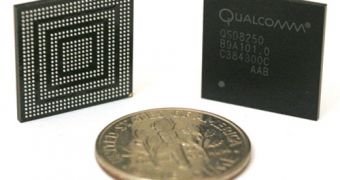Some may have heard that Qualcomm will soon release a new batch of application processors for mobile devices (smartphones, tablets), and it looks like they will have support for a certain OS not usually found on such items.
Qualcomm has been collaborating with Microsoft for a while, and it looks like this has affected the newest set of chips that the former is working on.
As we reported in this article, the company is about ready to unleash its newest set of Snapdragon application processors.
Said platforms will feature four cores each, setting a new performance standard and, thus, likely to give the NVIDIA Kal-El a run for its money.
Apparently, there will be support for the Windows 8 operating system, and this also goes for some dual-core models that will eventually appear.
The Snapdragon MSM8960, as they are called, have an integrated 3G/LTE modem which will be specifically designed with support for the OS.
“Qualcomm and Microsoft have a long and productive history of collaboration focused on driving innovation forward, and we are pleased to be among the leaders of the next evolution of mobile computing," said Luis Pineda, senior vice president of product management, computing and consumer products at Qualcomm.
"Our upcoming family of Snapdragon processors is intelligently integrated, optimized for mobile and built smarter, making it the ideal processor to address consumers' growing demands for new, innovative experiences and usage scenarios that we believe will be delivered by the next version of Windows."
Already tablets have a decent level of performance. Thus, since Windows has always had a knack for multi-tasking, Qualcomm is building its processors with special affinity for running multiple processes at once.
"Windows 8 will enable customers to have the flexibility, connectivity and power that they expect from Windows today with new, touch-only devices like tablets. This will require high-performing, low-power processors like those from Qualcomm, with features like 3G and 4G wireless wide area network (WWAN) connectivity," said Mike Angiulo, corporate vice president of Windows planning, hardware and PC ecosystem.

 14 DAY TRIAL //
14 DAY TRIAL //